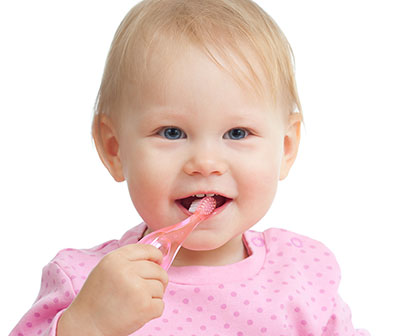Brushing and Flossing

Brushing and flossing are essential in keeping your child’s teeth healthy and cavity-free. Begin brushing at the sign of the first baby tooth and continue helping until your child is around the age of 8 to reduce the risk of cavities. Flossing should begin around the age of 4 when the molar contacts close in, and cavities are possible between the back teeth.
Fluoride/ Xylitol
Both fluoride and xylitol help reduce the risk of cavities, but for different reasons. Fluoride helps by strengthening the enamel (the outer structure of the teeth) to prevent the penetration of acids and bacteria. Xylitol helps by altering the bacteria in the mouth, changing it from the type that causes cavities to the kind that doesn’t cause cavities. Fluoride can be found in toothpaste, mouthwash and tap water in most municipalities, and xylitol can be found in mints, candies and gum.
Cheese/ Raw Fruits & Veggies
The mouth will be acidic after consuming anything with sugar or acids, and cavities are more likely in that environment. Surprisingly, eating a cube of cheese after eating something sweet or acidic helps prevent cavities because it lowers the mouth’s pH. Raw, crunchy fruits and vegetables such as carrots and apples can also help by cleansing the teeth of remaining sugars.
How to Spot a Cavity
Cavities in baby teeth can look like a chip or a stain. The colour can be anywhere from bright white, yellow or brown. You can find them along the gum line, between teeth and on the biting surfaces of teeth. If you have any suspicions about something that you see in your child’s mouth, be sure to bring them to the dentist for a check.
Why Cavities on Baby Teeth Should be Fixed
Cavities on baby teeth need to be fixed for several reasons. Baby teeth help with eating, chewing, speaking and smiling. Baby teeth are also the placeholders for the adult teeth to erupt, and a baby tooth lost premature can sometimes lead to an out-of-place eruption of the adult tooth, leading to crowding and the need for future braces. Cavities on baby teeth will also lead to infection if they are not fixed, causing unnecessary pain and distress to your child.
If you have any questions about how to keep your child’s teeth healthy and cavity-free, we encourage you to contact us today to schedule an appointment.
